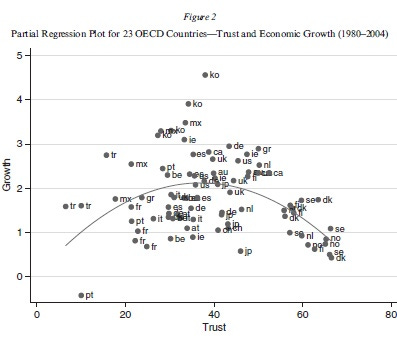Complacent Trust
Together with Zach Weinersmith, I’m currently writing All Roads Lead to Open Borders, my non-fiction graphic novel on the philosophy and social science of immigration. While there are many differences between a non-fiction graphic novel and a traditional work of non-fiction, I still strive to read broadly and deeply before I write. Now, for the chapter on “Crimes Against Culture,” I’m immersed in the vast academic literature on trust.
In economics, the word on the street is that trust is good for growth. And from what I’ve seen, the leading papers confirm this result. What’s striking, though, is that lower-profile papers occasionally reach rather different conclusions. This wouldn’t be noteworthy if the lower-profile papers were clearly lower-quality papers. But since the econometrics are simple, the main difference seems to be that the lower-profile papers were published later using more extensive data. In academia, the early bird gets the worm, even if the later bird is closer to the truth.
In coming months, I’ll be blogging some contrarian papers on trust. Today, let’s start with Felix Roth’s “Does Too Much Trust Hamper Economic Growth?” (Kyklos, 2009). Big result: Estimating growth as a function of trust and trust squared yields a strong quadratic relationship:
Regression 4, taking a country sample without transition countries, modulates trust as a curvilinear relationship to economic growth by including the squared term of interpersonal trust into the regression. Astonishingly, the curvilinear relationship is highly significant. All variables in the regression have the expected signs and are highly significant (99% level of significance). The linear and squared term of interpersonal trust are each statistically significant: 0.16 (4.42) and -0.0015 (-3.24). These estimates imply that starting from a low-trust country (where the interpersonal trust value is for instance 2.8, as in Brazil), increases in interpersonal trust tend to stimulate economic growth. However, the positive influence attenuates as the level of trust rises and reaches zero when the indicator takes on a mid-range of 53.3. Therefore, an increase in the level of trust appears to enhance economic growth in countries that have initial low levels of trust but to retard economic growth for countries that have already achieved a substantial level of trust.
Within the OECD sub-sample, “The positive influence attenuates as the level of trust rises and reaches zero when the indicator takes on a mid-range of 42.5.” Here’s the cool graph:

With fixed effects, moreover, the linear effect of trust on growth looks negative:
[T]aking panel data and using a fixed-effects estimation for a 41-country sample over the time period from 1980 to 2004 and with a total of 129 observations, the paper points out that economic growth is negatively related to an increase in trust. This negative finding is in contrast to most empirical findings using a cross-sectional design. The negative relationship seems to be mainly driven by developed countries from the OECD (here specifically Poland, Greece, and the United States), and the EU-15 (here particularly the
United Kingdomand Finland), and very strongly by LMEs [liberal market economies] and Scandinavian countries.
But how on Earth could trust ever be bad? The most obvious story is Cowenian. Excessive trust leads to (or is perhaps identical with) complacency. If everything is awesome, who needs innovation and dynamism?
Is this paper the final word? Of course not. Maybe the pro-trust consensus is right and Roth is wrong. But given the prevalence of academic groupthink, the opposite wouldn’t surprise me. At all.
The post appeared first on Econlib.

